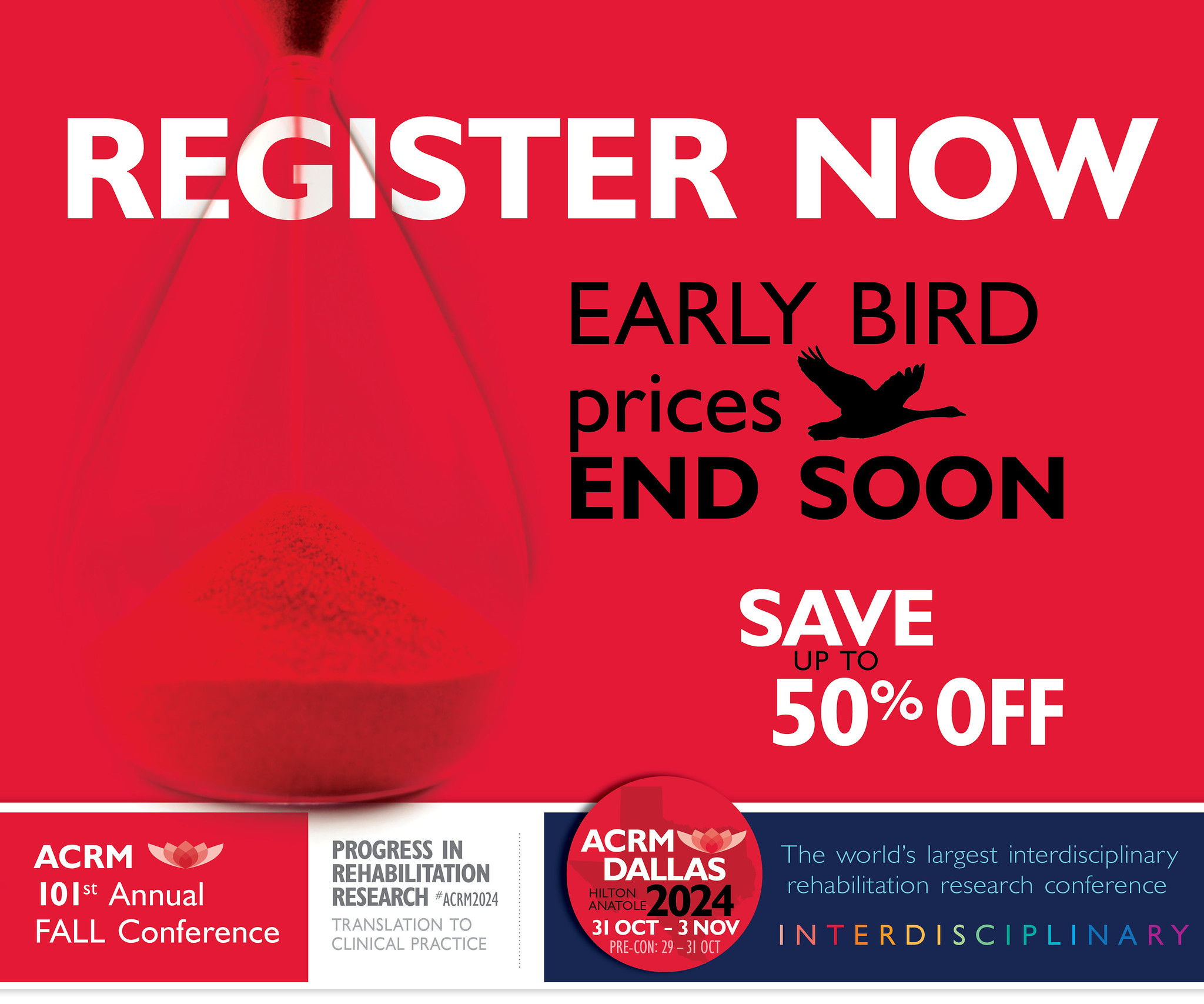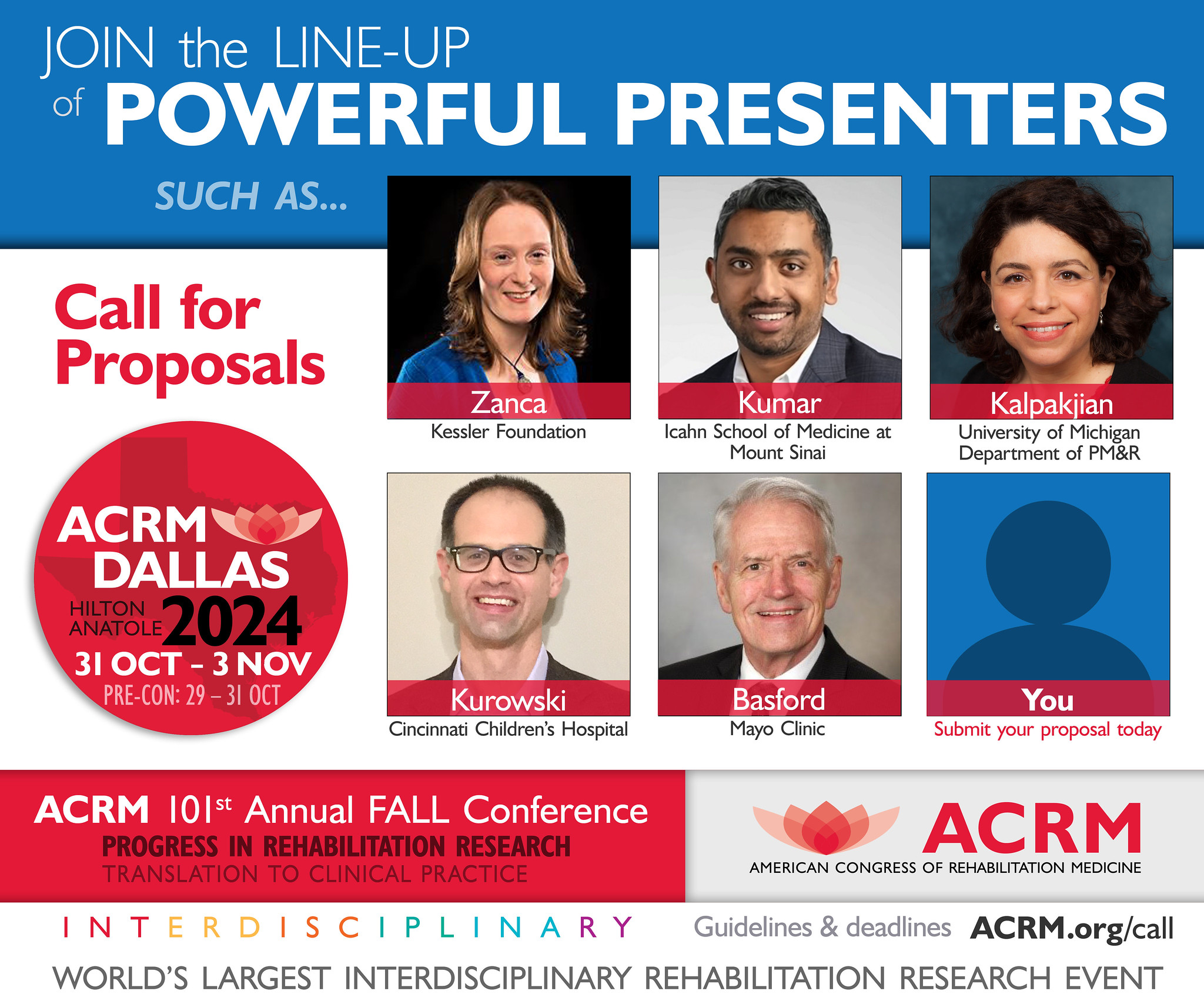Get to know and learn from your peers!
This new Research Spotlight column is intended to help you get to know the work of ACRM members from all career stages and disciplines, and to give you some insight about the different paths that people have taken along their career, and some words of wisdom about how is best to succeed as you navigate this path. We want to include you in one of our upcoming newsletters, so don’t be shy—contact Alison Cogan about this opportunity now!
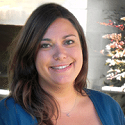 INTRODUCING Erica Weber, PhD
INTRODUCING Erica Weber, PhD
Clinical Neuropsychology
Postdoctoral Research Fellow
Kessler Foundation
What’s your current research focus or area you are most excited about?
My primary focus is on using principles from cognitive theories to rehabilitate prospective memory, or remembering to perform intended tasks at a specific time in the future, in neurological conditions. Deficits in prospective memory can severely impact an individual’s ability to function independently, which is of prime importance to those with disabilities. My work tests the efficacy of strategies that can enhance encoding of the prospective memory cue (i.e., what you are looking for in the environment to trigger your response) and can increase monitoring of the environment and time to promote better detection of that cue. Ultimately, we are hoping that we can find ways to translate these laboratory-based techniques to the real world.
What prompted/motivated you to choose that area?
Prior to graduate school, when I working as a psychometrist at a research center focused on neurocognitive consequences of HIV infection, I was often asked by research participants “what can I do to fix these types of memory problems?’ It struck me that many clinical neuropsychologists at the time were not interested in cognitive rehabilitation, and it would benefit our patient populations if we could cross-train scientists on understanding the mechanisms of specific cognitive deficits as well as how to fix them. Prospective memory deficits are easy to relate to, whether you’re speaking with patients or scientists/clinicians. We can all relate to forgetting to mail out that birthday card sitting on your table or forgetting to return an email. I’ve enjoyed this line of work because not only is it intellectually fascinating, but I can feel like I am making a tangible difference to the rehabilitation community.
Briefly, what path did you take to get there? Or what is your career trajectory- long-term goal?
I was hooked after my first experience with neuropsychology back in undergrad at Boston University. I asked my professor (Dr. Alice Cronin-Golomb) if she had any available space in her laboratory for an undergrad intern, and before I knew it, I was working on projects involving visuospatial deficits in HIV infection. Knowing I would be most competitive for graduate school with a few years of research under my belt, I accepted a research assistant position in San Diego, swayed by their strong neuropsychological tradition (and perhaps the promise of sunny skies and temperate weather). After 4 years, I entered the Joint Doctoral Program in Clinical Psychology at SDSU/UCSD, with my primary research focus studying prospective memory deficits in HIV infection at the UCSD HIV Neurobehavioral Research Program. Seeking more experience in rehabilitation and brain injury, I completed my internship at the Minneapolis VA. Most recently, I have been completing my postdoctoral fellowship at Kessler Foundation, which has been an ideal match for my interest in cognitive rehabilitation.
Advice for young scientists. Words of wisdom.
I have been fortunate to have fantastic mentors throughout every stage of my training. Sometimes, these mentors are in a formal capacity, like your graduate school program director or your lab’s PI. Other times, they’re the more advanced graduate student or a junior scientist while you’re a post-doc. Turn to these people for advice – early and often! Chances are, you are not the first person to deal with whatever challenge you may be facing, and it is incredibly helpful (and often quite validating) to get feedback or a second opinion. Find people who you trust and admire, who have gotten to the position you aspire to, and keep in contact. Not only does it help expand your professional network, but you’ll have greater exposure to ideas and paths you may not have thought of.
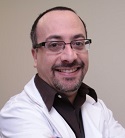 INTRODUCING Anthony H. Lequerica, PhD
INTRODUCING Anthony H. Lequerica, PhD
Neuropsychology/Clinical Research Scientist
Kessler Foundation Research Center
Department Traumatic Brain Injury Research
What’s your current research focus or area you are most excited about?
My current research focus is in two areas. One area of study is sleep disturbance after traumatic brain injury (TBI). The other is looking at cultural issues in neuropsychology and brain injury rehabilitation. Currently I’m most excited about the latter because I have started to bring my line of research to be more relevant to what I do clinically. As a clinical neuropsychologist at Kessler Institute for Rehabilitation, I see outpatients with a variety of cognitive deficits. Because I do testing in Spanish, the percentage of monolingual Spanish speakers being referred for evaluation has been steadily increasing.
What prompted/motivated you to choose that area?
My interest in cultural issues probably originates from my experiences growing up as the first generation of my family of Puerto Rican descent to be born in the continental U.S. My parents spoke English but my grandmother, despite living here for many years, knew only Spanish. I used to have to go with her to doctor appointments to translate and I saw the difficulties she faced in all aspects of her life when she had to interact with Anglo-American culture. While the Hispanic community is continuing to grow in the U.S., there are not enough Spanish-speaking neuropsychologists to meet the demands, and there are a number of associated areas of research in terms of assessment and intervention that have great room for improvement and innovation. So I think personal experience, training and skills, and opportunity all played a part in choosing this area of research.
Briefly, what path did you take to get there? Or what is your career trajectory- long-term goal?
I got my doctoral degree from Wayne State University. Their clinical psychology program provided exemplary training with a strong focus on research methods. A predoctoral externship at the Rehabilitation Institute of Michigan was where I discovered the field of Physical Medicine and Rehabilitation and became convinced that this was the field in which I wanted to build a career. I still was more interested in clinical work but my love for research led me to the University of Michigan where I did a post-doctoral fellowship in the Advanced Rehabilitation Research Training Program sponsored by the National Institute on Disability, Independent Living, and Rehabilitation Research. I am truly thankful for that opportunity because it shaped me into a well-rounded researcher and allowed me opportunities to further my studies in statistics which has been invaluable in giving me the knowledge necessary to lead data analysis projects to write manuscripts for publication. I am a big proponent of secondary data analysis driven by sound scientific theory.
What barriers or facilitators did you encounter along the way? If a barrier, how did you overcome that barrier.
What has been my biggest barrier has also provided me with great opportunities for success. Being 50% research/50% clinical for several years was very difficult because I was always doing 75/75. My brain thinks like a researcher but my heart needs to do clinical work. I can’t live without either. It was very difficult to advance in a research career without being able to pull in enough grant funding as a principal investigator. What allowed me to overcome that barrier was a very simple change from inpatient to outpatient on the clinical side and a re-allocation of time to 60% research and 40% clinical. For me, this is a very comfortable split because I have two days per week set aside for clinical work and three days for research. The responsibilities don’t spill over by having my time compartmentalized more rigidly. My current goal is to further develop a bridge to make my roles complimentary. This was not possible when inpatient clinical work was taking up so much of my time and energy. I alluded to opportunities for success as part of my split duties. My clinical work keeps me in direct contact with the areas where research and innovation are needed with direct feedback from patients as to their needs. Just as clinical work informs my research to be relevant and useful, my research informs my clinical work and there are several changes that have been implemented in clinical practice that has come from the introduction of research findings. This is what evidence based practice is all about.
Advice for young scientists. Words of wisdom.
I think one of the challenges I have faced is that it has taken me a while to realize my talents and focus on fully utilizing my strengths and things that make me unique and valuable to the field. I have learned that you have to be your own advocate and learn to promote yourself, sometimes in creative ways to capture the attention of important stakeholders, consumers, or funding agencies. If you don’t tell them and show them what you bring to the table that is important for the advancement of rehabilitation research, people are not going to go out of their way to pull it out of you. It took me some time to figure out where I actually “fit” in the big scheme of things and it came down to knowing what holes need to be filled and realizing that of all the things I’m passionate about, there were certain areas where everything comes together effortlessly: passion, talent, and need for growth in the field. Take advantage of ALL early career opportunities that are thrown your way. You will not be early career forever and these opportunities can be amazing for your educational, professional, and personal development. Also keep on networking and collaborating with colleagues who share the same passion for your area of interest.
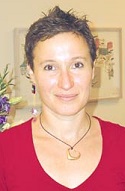 INTRODUCING Yael Goverover, PhD
INTRODUCING Yael Goverover, PhD
Associate Professor of Occupational Therapy
New York University, Steinhardt School of Culture, Education and
University of Wisconsin-Madison
What’s your current research focus or area you are most excited about?
My current research focus is on development and investigation of interventions for persons with cognitive and functional impairments. In the past I designed a randomized control study to investigate the effects of an awareness training protocol embedded within the practice of instrumental activities of daily living (IADLs) in participants with acquired brain injury on levels of self-awareness and functional performance. This study was supported by the National Institute on Disability and Rehabilitation Research (NIDDR) Switzer fellowship. The results of this study support further investigation of this treatment protocol. Therefore, in the next few years my goal is to write and submit a grant proposal to a federal agency. More recently, I designed a treatment protocol to use the self-generation strategy to improve learning and memory of persons with multiple sclerosis using functional activities. The data we collected is also a base for a future federal grant.
What prompted/motivated you to choose that area?
My research agenda and goals began when I worked as an occupational therapist in an acute neurosurgical unit in a general hospital in Israel. While working in this setting, I was intrigued with two main topics: (1) with the discrepancies between performance on neuropsychological assessment and performance of activities of daily living, (2) I observed the power of meaningful activities in the therapy process. I found that, at times, people can do a functional, meaningful activity better than a rote exercise activity. These two topics are the basis for my scholarly work.
Briefly, what path did you take to get there? Or what is your career trajectory- long-term goal?
I studied for BA and MS in Israel and came to NYU to study for the PhD. Then to acquire more research skills, I decided to do a post-doc fellowship. I was a post-doctorate fellow in the Advanced Rehabilitation Research Training Program (ARRTP) in Outcomes and Treatment Effectiveness of Cognitive Rehabilitation at the University of Medicine and Dentistry of New Jersey (UMDNJ) and the Kessler Foundation. During this time, I applied for grants, conducted my own studies, and developed my line of research. For the next three years, I plan to submit two federal grants and continue to publish.
Did you have any pivotal experience that propelled your research success?
The post-doc fellowship was the most meaningful thing I have done to propel my research success for two reason: it provide me unlimited time under a scholarly supervision to develop both my line of research and my research skills. In my recent life as an academic scholar, I have to teach, serve the university, and not necessarily focus on research. During my post-doc fellowship I devoted all of my time just for that, which was pivotal in paving my way to accomplishments.
Advice for young scientists. Words of wisdom.
Perseverance is a key word … if you want to be successful you should persevere and don’t get discourage. You should be patient and, at the same time, don’t get too attached to your work, and most importantly remember to balance your life. Life is not just research.


